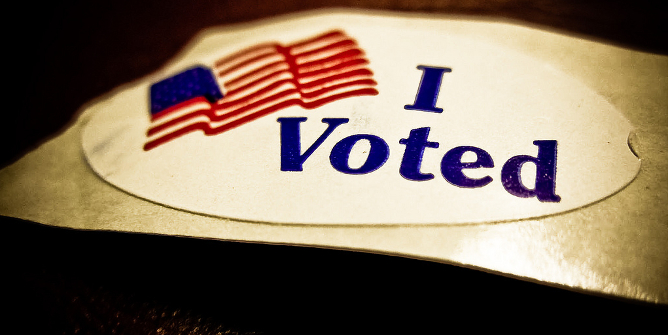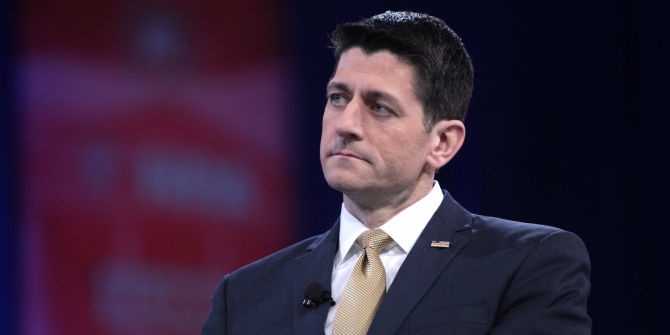

 For over a century, state governors have had the power to appoint US Senators to vacant seats, a power which runs against the idea of Senators as being democratic representatives. But do governors appoint those with similar ideologies to themselves? In new research which reviewed senate candidates considered by governors to fill vacancies, Christopher Cooper, H. Gibbs Knotts, and Jordan Ragusa find that while they rarely appoint senators from a different party, they tend to skew towards the middle – appointing those who are closest to the ideology of the state’s median voter.
For over a century, state governors have had the power to appoint US Senators to vacant seats, a power which runs against the idea of Senators as being democratic representatives. But do governors appoint those with similar ideologies to themselves? In new research which reviewed senate candidates considered by governors to fill vacancies, Christopher Cooper, H. Gibbs Knotts, and Jordan Ragusa find that while they rarely appoint senators from a different party, they tend to skew towards the middle – appointing those who are closest to the ideology of the state’s median voter.
Over the last 200 years, institutional reforms have given citizens a greater voice in American democracy. An example of this trend is the Seventeenth Amendment, adopted in 193, and best known for removing the power of selecting United States senators from the country’s state legislators and placing it into the hands of the people, through direct elections.
The 17th amendment included another provision that runs counter to this trend of great citizen voice, however. Clause 2 dictates that when a US Senator vacates office, the Governor has the power to appoint a replacement “until the people fill the vacancies by election as the legislature may mandate.” Essentially, this means that the same Amendment that democratized Senate elections, simultaneously created an antidemocratic and expedient mechanism for Governors to appoint US senators in case of an unexpected vacancy.
Although such vacancies are unexpected that does not, as one might assume, mean they are infrequent. In an average decade, senate appointments occur more than 18 times, and more than one-third of the US population is represented by at least one appointed US Senator. Currently, there are only three states that strip the governor of his/her appointment power, mandating a special election prior to appointment (although certain states do place restrictions on those appointments).
Not surprisingly, a number of scholars and political commentators have criticized this provision as a “gap in popular representation”, and an antidemocratic provision that can even lead to bribery, as it did in the case of Illinois Governor Rod Blagojevich. This is not merely an academic debate; it has even entered the halls of Congress. US Senator Russell Feingold (D-WI) introduced a bill in the Judiciary Committee calling for the abolishment of gubernatorial appointment of US senators.
In recent research, we investigated whether gubernatorial appointments of US Senate vacancies were as anti-democratic as the academic literature and the political reformers might have us believe.

Based on the literature, we offered three competing hypothesis about how appointments might work. In the first hypothesis, we tested whether governors tended to select nominees who were closest to their own ideological views—regardless of what anyone else might prefer. Our second hypothesis suggests that governors appoint senators who are closest to the state’s median voter. This represents the idea that the electorate may serve as a ‘gun behind the door’—exerting power through implicit threat rather than formal power. The third hypothesis suggests that it is neither the governor’s ideology, nor the electorate’s ideology that matters—it is the ideology of the previous office-holder that drives the choice of appointment. This hypothesis represents the idea that governors tend to choose nominees who hew closest to the previous office-holder’s ideological position.
In order to test these hypotheses, we needed not only the name and ideology of the eventual nominee (information that’s fairly easy to ascertain), but also the names and estimated ideologies of the people the governor considered, but did not select. To do this, we reviewed national and state level newspapers for mentions of potential candidates. These searches yielded 3.6 considered nominees per Senate vacancy. Once we identified the potential nominees, we relied on Adam Bonica’s “campaign finance scores (CF) scores” culled from the Database on Ideology, Money in Politics and Elections (DIME), to determine an ideology estimate for the nominee and potential nominee.
So, what did we find? First, and not surprisingly, governors rarely appoint senators who hail from a different party than they do. Despite this, we discovered that, at least in this case, the voice of the people is like rising water—it finds a way to seep through barriers and blockades. Despite having few, if any, restrictions on their power, governors tend to appoint senators who fall closest not to their own ideology, but to the ideology of the median voter in the state. In other words, governors eschew appointees who are most like themselves and instead appoint replacements who resemble voters in their states. Further, we find that this effect is greatest when governors are facing an impending election. Even in a case where governors have few (if any) constraints on their behavior, it is the voice of the people that ultimately determines the nominee.
The Seventeenth Amendment’s two provisions—one which estimated direct election of senators and one which placed the power of appointment in the hands of the governor—seem at odds with one another. And, in intent, they are. Despite this, evidence from Schiller and Stewart’s work shows that the first provision did not strengthen representation as much as reformers of the day might have expected. And, we find that the second provision did not restrict the voice of the people as much as reformers of today have charged.
This article is based on the paper, ‘The Constrained Governor Exploring Gubernatorial Decision Making on Senate Appointments’ in Political Research Quarterly.
Featured image credit: By US Government (The National Archives) [Public domain], via Wikimedia Commons
Please read our comments policy before commenting.
Note: This article gives the views of the author, and not the position of USApp– American Politics and Policy, nor of the London School of Economics.
Shortened URL for this post: http://bit.ly/2e0MzvO
______________________
 Christopher A. Cooper – Western Carolina University
Christopher A. Cooper – Western Carolina University
Christopher A. Cooper is Professor and Department Head in the Department of Political Science and Public Affairs and Professor (by Courtesy) in the Department of Psychology at Western Carolina University.
 H. Gibbs Knotts – College of Charleston
H. Gibbs Knotts – College of Charleston
H. Gibbs Knotts is Professor and Department Chair in the Department of Political Science at the College of Charleston.
 Jordan Ragusa – College of Charleston
Jordan Ragusa – College of Charleston
Jordan Ragusa is Assistant Professor in the Department of Political Science at the College of Charleston






